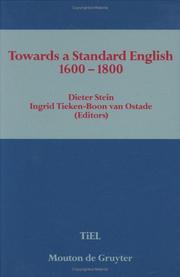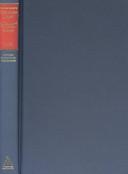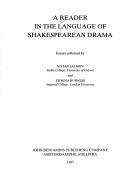| Listing 1 - 10 of 12 | << page >> |
Sort by
|
Book
ISBN: 023396262X 9780233962627 Year: 1981 Publisher: London Deutsch
Abstract | Keywords | Export | Availability | Bookmark
 Loading...
Loading...Choose an application
- Reference Manager
- EndNote
- RefWorks (Direct export to RefWorks)
English language --- -Germanic languages --- History --- -History --- -English language --- History. --- Early modern English language --- Germanic languages
Book
ISBN: 382041522X 9783820415223 Year: 1988 Volume: Bd. 22 Publisher: Frankfurt am Main Lang
Abstract | Keywords | Export | Availability | Bookmark
 Loading...
Loading...Choose an application
- Reference Manager
- EndNote
- RefWorks (Direct export to RefWorks)
Lexicology. Semantics --- English language --- Grammar --- Anglais (Langue) --- Verb --- Verbe --- 802.0-5 --- Engels: grammatica --- 802.0-5 Engels: grammatica --- ENGLISH LANGUAGE --- VERB --- MODERN ENGLISH

ISBN: 311013697X 3111878430 3110864282 9783110864281 9783110136975 Year: 1994 Volume: 12 Publisher: Berlin de Gruyter
Abstract | Keywords | Export | Availability | Bookmark
 Loading...
Loading...Choose an application
- Reference Manager
- EndNote
- RefWorks (Direct export to RefWorks)
-Standardization --- English language --- -English language --- Standardization --- Historical linguistics --- anno 1600-1699 --- anno 1700-1799 --- Standardization. --- Early modern English language --- Germanic languages

ISBN: 1281294357 9786611294359 1847141234 9781847141231 0826473229 0826491235 9780826473226 9780826491237 9781472555403 1472555406 Year: 2006 Publisher: London Continuum
Abstract | Keywords | Export | Availability | Bookmark
 Loading...
Loading...Choose an application
- Reference Manager
- EndNote
- RefWorks (Direct export to RefWorks)
Most scholarly attention on Shakespeare's vocabulary has been directed towards his enrichment of the language through borrowing words from other languages and has thus concentrated on the more learned aspects of his vocabulary. But the bulk of Shakespeare's output consists of plays in which he employs a colloquial and informal style using such features as discourse markers or phrasal verbs. Both today and in earlier periods many informal words were gradually accepted into the standard language, and it may be difficult to recognize when certain words have become acceptable. This dictionary list
English language --- Germanic languages --- Early modern. --- Early modern, 1500-1700. --- Early modern English language --- Dialectology --- Historical linguistics --- Shakespeare, William --- Language --- Glossaries, etc. --- Early modern, 1500-1700 --- Dictionaries
Book
ISBN: 9783110522389 9783110525281 9783110523034 3110522381 9783110522730 9783110522761 9783110522778 9783110522792 9783110525304 9783110523058 9783110525328 9783110522969 9783110525045 9783110523041 9783110525069 9783110522914 3110523035 3110525283 3110522969 3110525321 3110523051 3110525305 3110522918 3110525062 3110523043 3110525046 311052273X 9783110523065 3110522764 9783110525052 3110525054 3110522799 3110522772 Year: 2017 Publisher: Berlin, [Germany] ; Boston, [Massachusetts] : De Gruyter Mouton,
Abstract | Keywords | Export | Availability | Bookmark
 Loading...
Loading...Choose an application
- Reference Manager
- EndNote
- RefWorks (Direct export to RefWorks)
The volume provides a wide-ranging account of Middle English, organized by linguistic level. Not only are the traditional areas of linguistic study explored in state-of-the-art chapters, but the volume also covers less traditional areas of study, including creolization, sociolinguistics, literary language (including the language of Chaucer), pragmatics and discourse, dialectology, standardization, language contact, and multilingualism. This volume provides a wide-ranging account of Middle English, organized by linguistic level. Not only are the traditional areas of linguistic study explored in state-of-the-art chapters on Middle English phonology morphology, syntax, and semantics written by experts in the field, but the volume also covers less traditional areas of study, including Middle English creolization, sociolinguistics, literary language (including the language of Chaucer), pragmatics and discourse, dialectology, standardization, language contact, and multilingualism.
Historical linguistics --- English language --- History. --- Anglo-Saxon language (c. 600-1100) --- History --- E-books --- Germanic languages --- Grammar --- Diachronic linguistics --- Dynamic linguistics --- Evolutionary linguistics --- Language and languages --- Language and history --- Linguistics --- Variation&delete& --- Diatects&delete& --- Historical linguistics. --- Variation --- Diatects --- Grammar. --- Early Modern English. --- English historical linguistics. --- Middle English. --- Old English.
Book
ISBN: 1282673211 9786612673214 3110228858 9783110228854 311022884X 9783110228847 Year: 2010 Publisher: Berlin Boston
Abstract | Keywords | Export | Availability | Bookmark
 Loading...
Loading...Choose an application
- Reference Manager
- EndNote
- RefWorks (Direct export to RefWorks)
Transparency and Dissimulation analyses the configurations of ancient neoplatonism in early modern English texts. In looking closely at poems and prose writings by authors as diverse as Thomas Wyatt, Philip Sidney, Edmund Spenser, John Donne, Edward Herbert, Andrew Marvell, Thomas Traherne, Thomas Browne and, last not least, Aphra Behn, this study attempts to map the outlines of a neoplatonic aesthetics in literary practice as well as to chart its transformative potential in the shifting contexts of cultural turbulency and denominational conflict in 16th- and 17th-century England. As part of a "new", contextually aware, aesthetics, it seeks to determine some of the functions neoplatonic structures - such as forms of recursivity or certain modes of apophatic speech - are capable of fulfilling in combination and interaction with other, heterogeneous or even ideologically incompatible elements. What emerges is a surprisingly versatile poetics of excess and enigma, with strong Plotinian and Erigenist accents. This appears to need the traditional ingredients of petrarchism or courtliness only as material for the formation of new and dynamic wholes, revealing its radical metaphysical potential above all in the way it helps to resist the easy answers - in religion, science, or the fashions of libertine love.
English literature --- Neoplatonism in literature. --- Renaissance --- History and criticism. --- Greek influences. --- Plato --- Platon --- Aflāṭūn --- Aplaton --- Bolatu --- Platonas --- Platone --- Po-la-tʻu --- Pʻŭllatʻo --- Pʻŭllatʻon --- Pʻuratʻon --- Πλάτων --- אפלטון --- פלאטא --- פלאטאן --- פלאטו --- أفلاطون --- 柏拉圖 --- 플라톤 --- Платон --- プラトン --- Influence. --- Early Modern Culture. --- Early Modern English Literature. --- Literary Aesthetics. --- Neoplatonism. --- Transformations of Antiquity.
Book
ISBN: 152612968X 9781526129680 9780719068744 9780719068751 Year: 2010 Publisher: Manchester, UK
Abstract | Keywords | Export | Availability | Bookmark
 Loading...
Loading...Choose an application
- Reference Manager
- EndNote
- RefWorks (Direct export to RefWorks)
Plain ugly examines depictions of physically repellent characters in a striking range of early modern literary and visual texts, offering fascinating insights into the ways in which ugliness and deformity were perceived and represented, particularly with regard to gender and the construction of identity. The book focuses closely on English literary culture but also engages with wider European perspectives, drawing on a wide array of primary sources including Italian and other European visual art. Offering illuminating close readings of texts from both high and low culture, it will interest scholars in English literature, cultural studies, women's studies, history and art history, as well as postgraduate and undergraduate students in these disciplines. As an accessible and absorbing account of the power dynamics informing depictions of ugliness (and beauty) in relation to some of the quirkiest literary and visual material to be found in early modern culture, it will also appeal to a wider audience.
European literature --- English literature --- Abnormalities, Human, in art. --- Abnormalities, Human, in literature. --- Ugliness in art. --- Ugliness in literature. --- Ugliness as a theme in literature --- History and criticism. --- [Literature --- Literary Studies: C 1500 To C 1800 --- [LITERARY CRITICISM / European / English, Irish, Scottish, Welsh --- Ireland --- English drama. --- European visual art. --- Silenus figures. --- compelling art. --- early modern English culture. --- masculine identity. --- models of identity. --- twelfth-century German kingdom. --- ugly woman. --- unattractive human body. --- unattractive mistresses English literature.
Book
ISBN: 0719084970 1526103273 1847798918 9781847798916 9781526103277 9780719084973 1526103281 Year: 2015 Publisher: Manchester, UK : Manchester University Press,
Abstract | Keywords | Export | Availability | Bookmark
 Loading...
Loading...Choose an application
- Reference Manager
- EndNote
- RefWorks (Direct export to RefWorks)
Why are early modern English dramatists preoccupied with unfinished processes of 'making' and 'unmaking'? And what did the terms 'finished' or 'incomplete' mean for dramatists and their audiences in this period? Making and unmaking in early modern English drama is about the significance of visual things that are 'under construction' in works by playwrights including Shakespeare, Robert Greene and John Lyly. Illustrated with examples from across visual and material culture, it opens up new interpretations of the place of aesthetic form in the early modern imagination. Plays are explored as a part of a lively post-Reformation visual culture, alongside a diverse range of contexts and themes, including iconoclasm, painting, sculpture, clothing and jewellery, automata and invisibility. Asking what it meant for Shakespeare and his contemporaries to 'begin' or 'end' a literary or visual work, this book is essential reading for scholars and students of early modern English drama, literature, visual culture and history.
English drama --- Art and literature --- History and criticism. --- History --- Theatrical science --- Drama --- English literature --- anno 1500-1599 --- anno 1600-1699 --- Iconoclasm in literature. --- Unfinished works of art. --- Art in literature. --- Material culture in literature --- Literature and art --- Literature and painting --- Literature and sculpture --- Painting and literature --- Sculpture and literature --- Aesthetics --- Literature --- Art, Incomplete --- Art, Unfinished --- Arts, Incomplete --- Arts, Unfinished --- Incomplete works of art --- Art --- Arts --- literature --- plays and playwrights --- Apelles --- Brazen head --- Early Modern English --- Early modern period --- England --- Iconoclasm --- Visual arts --- Visual culture --- William Shakespeare --- Visual perception in literature. --- Literature and literary studies --- Literature: history and criticism / Literary studies: plays and playwrights. --- LITERARY CRITICISM --- Biography, Literature & Literary studies --- Drama. --- Literary studies: plays & playwrights.

ISBN: 1283313863 9786613313867 9027278865 9789027278869 0915027992 9780915027996 Year: 1987 Publisher: Amsterdam Philadelphia J. Benjamins Pub. Co.
Abstract | Keywords | Export | Availability | Bookmark
 Loading...
Loading...Choose an application
- Reference Manager
- EndNote
- RefWorks (Direct export to RefWorks)
In recent years the language of Shakespearean drama has been described in a number of publications intended mainly for the undergraduate student or general reader, but the studies in academic journals to which they refer are not always easily accessible even though they are of great interest to the general reader and essential for the specialist. The purpose of this collection is therefore to bring together some of the most valuable of these studies which, in discussing various aspects of the language of the early 17th century as exemplified in Shakespearean drama, provide the reader with deep
English language --- Shakespeare, William, --- Shakespeare, William --- Shakespear, William, --- Shakspeare, William, --- Šekʻspiri, Uiliam, --- Saixpēr, Gouilliam, --- Shakspere, William, --- Shikisbīr, Wilyam, --- Szekspir, Wiliam, --- Šekspyras, --- Shekspir, Vilʹi︠a︡m, --- Šekspir, Viljem, --- Tsikinya-chaka, --- Sha-shih-pi-ya, --- Shashibiya, --- Sheḳspir, Ṿilyam, --- Shaḳspir, Ṿilyam, --- Syeiksŭpʻio, --- Shekspir, V. --- Szekspir, William, --- Shakespeare, Guglielmo, --- Shake-speare, William, --- Sha-ō, --- Şekspir, --- Shekspir, Uiliam, --- Shekspir, U. --- Šekspir, Vilijam, --- Ṣēkspiyar, Viliyam, --- Shakspir, --- Shekspyr, Vyli︠e︡m, --- Şekspir, Velyam, --- Ṣēkspiyar, Villiyam, --- Shēkʻspʻiyr, Vlilliam, --- Ṣēkspiyar, --- Ṣēkspiyar Mahākavi, --- Ṣēkspiyar Mahākaviya, --- Sheḳspier, Ṿilyam, --- Shēkʻspir, --- Shakespeare, --- Śeksper, --- Шекспир, Вильям, --- Шекспир, Уильям, --- שייקספיר, וויליאם, --- שייקספיר, וו., --- שיקספיר, וויליאם --- שיקספיר, ויליאם --- שיקספיר, ויליאם, --- שכספיר, ויליאם, --- שכספיר, וילים, --- שכספיר, ו׳ --- שעפקספיר, וויליאם, --- שעקספיער, וויליאם --- שעקספיער, וויליאם, --- שעקספיער, ווילליאם --- שעקספיער, וו., --- שעקספיר --- שעקספיר, וו --- שעקספיר, וויליאם, --- שעקספיר, וויליאמ --- שעקספיר, ווילליאם --- שעקספיר, ווילליאם, --- שעקספיר, וו., --- שעקספיר, װיליאם, --- שעקספיר, װילליאם, --- שעקספיר, װ., --- שעקספער --- שעקספער, וויליאמ --- שקספיר --- שקספיר, וו --- שקספיר, וויליאם --- שקספיר, וויליאם, --- שקספיר, ווילים, --- שקספיר, וילאם --- שקספיר, ויליאם --- שקספיר, ויליאם, --- שקספיר, ויליים, --- שקספיר, וילים --- שקספיר, וילים, --- شاكسبير، وليم --- شاكسپير، وليم --- شكسبير، وليام --- شكسبير، وليم --- شكسبير، وليم، --- شكسبير، و. --- شكسپير، وليم --- شكسپير، ويليام --- شيكسبير، وليام --- شيكسبير، وليام.، --- شيكسبير، وليم --- شکسبير، وليم --- وليم شکسبير --- 沙士北亞威廉姆, --- 沙士比亞威廉姆, --- 莎士比亞威廉姆, --- 莎士比亞威廉, --- 莎士比亞, --- Language. --- Early modern English language --- Germanic languages
Book
ISBN: 9781503607583 1503607585 9780804791939 9781503607576 0804791937 1503607577 Year: 2018 Publisher: Stanford, California
Abstract | Keywords | Export | Availability | Bookmark
 Loading...
Loading...Choose an application
- Reference Manager
- EndNote
- RefWorks (Direct export to RefWorks)
For all that we love and admire Shakespeare, he is not that easy to grasp. He may have written in Elizabethan English, but when we read him, we can't help but understand his words, metaphors, and syntax in relation to our own. Until now, explaining the powers and pleasures of the Bard's language has always meant returning it to its original linguistic and rhetorical contexts. Countless excellent studies situate his unusual gift for words in relation to the resources of the English of his day. They may mention the presumptions of modern readers, but their goal is to correct and invalidate any false impressions. Shakesplish is the first book devoted to our experience as modern readers of Early Modern English. Drawing on translation theory and linguistics, Paula Blank argues that for us, Shakespeare's language is a hybrid English composed of errors in comprehension—and that such errors enable, rather than hinder, some of the pleasures we take in his language. Investigating how and why it strikes us, by turns, as beautiful, funny, sexy, or smart, she shows how, far from being the fossilized remains of an older idiom, Shakespeare's English is also our own.
English language --- Psychological aspects. --- Shakespeare, William, --- Shakespeare, William --- Shakespear, William, --- Shakspeare, William, --- Šekʻspiri, Uiliam, --- Saixpēr, Gouilliam, --- Shakspere, William, --- Shikisbīr, Wilyam, --- Szekspir, Wiliam, --- Šekspyras, --- Shekspir, Vilʹi︠a︡m, --- Šekspir, Viljem, --- Tsikinya-chaka, --- Sha-shih-pi-ya, --- Shashibiya, --- Sheḳspir, Ṿilyam, --- Shaḳspir, Ṿilyam, --- Syeiksŭpʻio, --- Shekspir, V. --- Szekspir, William, --- Shakespeare, Guglielmo, --- Shake-speare, William, --- Sha-ō, --- Şekspir, --- Shekspir, Uiliam, --- Shekspir, U. --- Šekspir, Vilijam, --- Ṣēkspiyar, Viliyam, --- Shakspir, --- Shekspyr, Vyli︠e︡m, --- Şekspir, Velyam, --- Ṣēkspiyar, Villiyam, --- Shēkʻspʻiyr, Vlilliam, --- Ṣēkspiyar, --- Ṣēkspiyar Mahākavi, --- Ṣēkspiyar Mahākaviya, --- Sheḳspier, Ṿilyam, --- Shēkʻspir, --- Shakespeare, --- Śeksper, --- Шекспир, Вильям, --- Шекспир, Уильям, --- שייקספיר, וויליאם, --- שייקספיר, וו., --- שיקספיר, וויליאם --- שיקספיר, ויליאם --- שיקספיר, ויליאם, --- שכספיר, ויליאם, --- שכספיר, וילים, --- שכספיר, ו׳ --- שעפקספיר, וויליאם, --- שעקספיער, וויליאם --- שעקספיער, וויליאם, --- שעקספיער, ווילליאם --- שעקספיער, וו., --- שעקספיר --- שעקספיר, וו --- שעקספיר, וויליאם, --- שעקספיר, וויליאמ --- שעקספיר, ווילליאם --- שעקספיר, ווילליאם, --- שעקספיר, וו., --- שעקספיר, װיליאם, --- שעקספיר, װילליאם, --- שעקספיר, װ., --- שעקספער --- שעקספער, וויליאמ --- שקספיר --- שקספיר, וו --- שקספיר, וויליאם --- שקספיר, וויליאם, --- שקספיר, ווילים, --- שקספיר, וילאם --- שקספיר, ויליאם --- שקספיר, ויליאם, --- שקספיר, ויליים, --- שקספיר, וילים --- שקספיר, וילים, --- شاكسبير، وليم --- شاكسپير، وليم --- شكسبير، وليام --- شكسبير، وليم --- شكسبير، وليم، --- شكسبير، و. --- شكسپير، وليم --- شكسپير، ويليام --- شيكسبير، وليام --- شيكسبير، وليام.، --- شيكسبير، وليم --- شکسبير، وليم --- وليم شکسبير --- 沙士北亞威廉姆, --- 沙士比亞威廉姆, --- 莎士比亞威廉姆, --- 莎士比亞威廉, --- 莎士比亞, --- Language. --- Literary style. --- Early modern English language --- Shakespeare, William, 1564-1616 --- Anglais (langue) --- Germanic languages
| Listing 1 - 10 of 12 | << page >> |
Sort by
|

 Search
Search Feedback
Feedback About UniCat
About UniCat  Help
Help News
News